Cunjevoi by Caitlin Doyle-Markwick
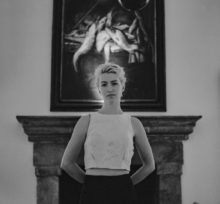 Caitlin Doyle-Markwick is an activist, writer and performer from Sydney, by way of Newcastle. Her writing has appeared in publications like Overland, Antipodes and Otoliths. Working with her theatre collective BigMuscles SadHeart, she wrote and produced her first play, JobReady, a surreal, black comedy about the welfare system, in 2017. In 2019 she was a resident playwright at the Old 505 Theatre, where her latest play, As She Lay, will premier in 2020. Caitlin is a member of Solidarity and the Refugee Action Coalition.
Caitlin Doyle-Markwick is an activist, writer and performer from Sydney, by way of Newcastle. Her writing has appeared in publications like Overland, Antipodes and Otoliths. Working with her theatre collective BigMuscles SadHeart, she wrote and produced her first play, JobReady, a surreal, black comedy about the welfare system, in 2017. In 2019 she was a resident playwright at the Old 505 Theatre, where her latest play, As She Lay, will premier in 2020. Caitlin is a member of Solidarity and the Refugee Action Coalition.
Cunjevoi
Tiny bubbles of oil swell and pop, and swell and pop, occasionally sending boiling droplets flying outwards like golden spittle. Little red-black dots speckle my forearms where it has got me before.
The blood smell has gone and has been replaced with the protein smell. The meat smell. I flip the patty and it hisses at me. Steam billows up and around my face.
I feel a hand on my waist. Not my waist, the bit halfway between back and bum, whatever that bit’s called. Jamie leans around me, but not so close that the steam gets him.
‘Mairana, would you mind jumping up to the counter for a while? We’re a bit short.’
‘Ah, yeah… sure’, I say, shifting to the left to let his hand drop off my body.
‘Geordie, can you…?’ he looks at Geordie and indicates, with a yellow-white latex-gloved hand, to the two hotplates. Geordie nods, moves in between the two plates. You get to be dextrous with those spatula and tongs after a while, like Geordie is.
I go out the back to swap my apron for a clean one and examine myself in the mirror. The sweat sits thick on my face. I wipe it off but it appears again straight away. My skin has broken out in pimples again. There’s a halo of frizz around my head, and my black curls spring out at all angles. I try to flatten it all with my palms, but then give up and pull it all back into a hairnet.
I step back to see myself from a distance. My shirt stretches too tightly across my boobs. I gained weight, will have to lose it so that button doesn’t pop. I pull the apron up and re-tie it.
I look through the round window into the kitchen. The door keeps out most of the sound and it’s like looking in on a silent film, one stuck on loop where the machines and the people keep doing the same movements. I cross my eyes slightly to blur my vision. Now it looks like a watercolour, where the paint hasn’t dried yet and is still sliding across the page. All smudgy silver, yellow, red. Sometimes I do this, just to soften things a bit.
Jamie’s face appears in the window, a blot of pink.
‘Coming,’ I say, refocusing my eyes. I swing the door open and walk up to the counter.
For the year I’ve worked here I’ve managed to stay mostly on cooking, where I don’t have to face the public and I can’t hear the train announcements flooding in through the front doors every other minute.
A customer waits while I navigate the ordering system. I pretend not to notice him. If I say sorry he’ll think I’ve done something wrong, so I don’t. I want to tell him, it’s this computer, the bastard-of-a-thing, but I don’t.
‘I need to jump on a train at 10:50,’ he says.
‘Just a minute.’ My uniform is sticking to the sweat on my back. ‘Okay. What can I get you?’
‘A large chicken nugget meal, please, with Fanta, not Coke.’
I notice the man’s collar is stained yellow where it meets his neck. Doesn’t he know not to wear white twice in a row?
‘Will that be all?’
‘Yes, thanks.’
‘Tap here, please.’
He pulls his card out of his breast pocket, which has a blue logo on it in a star shape, and a pen stain.
‘Thanks, Darl’’. He’s happier now his nuggets are coming.
‘Mairana, you’ll have to pick up the pace before peak hour.’ Jamie’s voice comes up from behind me. ‘We’ll be getting slammed soon.’
‘Okay.’
He walks back into his office out the back.
‘Little prick,’ Clara says, only loud enough for me to hear. She’s behind the computer next to me. Clara’s worked here for three years, Jamie for nine months.
‘Geordie reckons he’s getting promoted to regional manager soon,’ I say.
‘Scum always floats to the top,’ she replies.
‘Ha…Yeah.’ I wonder if scum would have bought us all Celebrations chocolates for Easter when he arrived, like Jamie did. Probably. A scummy ploy, maybe.
For the next two hours, the orders come non-stop. It’s just past two o’clock, the end of my shift, when they slow to a halt.
‘Where’d you say you moved to, Mairana?’ Clara asks in front of the lockers.
‘Arncliffe,’ I lie.
‘Ah yeah, that’s right. Same line as me. Leaves in five, we better be quick.’
‘I’m actually going to stay at a friend’s house nearby,’ I lie again.
‘Oh.’ She smiles and winks, ‘got it.’
Some clothes and a book fall out of my locker onto the ground.
‘You wanna squish a bit more in there?’ she says.
‘I keep meaning to clear it out but… you know.’
‘Yeah. G’night. See you tomorrow.’
‘Yep. See ya then.’ I wait for her to leave before I pull out the blanket.
I check my phone. I’ve missed the Lithgow train. Damn. The Newcastle train, second best, leaves in five minutes. I check that Clara has gone and then run across the station hall and through the gates.
I manage to go unnoticed by the noisy lads going back to the Coast, and find an almost empty carriage. The nylon seats are purple now. I like it better than the bureaucracy-green of the old seats. Purple feels softer, more like a colour someone might paint their bedroom.
I lie down on one of the three-seat chairs and pull my blanket around me as the train starts moving. A voice comes through the overhead speaker in a tired, indifferent drawl. Sometimes I feel like the surly tones of the drivers are reserved for me, as if they can see me through their cameras, curled up on seats that were made exclusively for bums, thighs and backs, not for torsos, heads, feet. Or like I’m a stranger they found lying on their porch in the morning.
‘Thank you… we hope… journey.’ I catch the driver’s last words.
I open my book to the dog-eared page. I found this book on the last train. Next door to Number Twelve-and-a-half was an empty shop. It had been empty for so long that Mumma often groaned and grunted her way through a hole in the paling fence and hung here washing in the backyard. When Roie and Dolour were little they had often peered through the black glass… But I’m too tired to keep reading. I drape a scarf over my eyes to block out the light as the train staggers out of the city.
A hand pats my shoulder gently.
‘Good morning, Mairana.’ Rohit is looking over me with his nice smile, holding his cleaning equipment, a bag in one hand and the long pincer tool in the other.
The train is still and the sky outside is turning pink.
‘Did you sleep well?’
‘Yeah,’ I say. ‘Pretty well.’ My body feels heavy and my eyes aren’t ready to open yet. ‘Deeply, anyway.’
‘No trouble?’ he says.
‘No, no trouble.’ I rub my eyes. ‘Thanks for waking me.’
‘You are welcome. You have a good day, take care.’
‘You too. See you soon.’
He pincers a soggy newspaper and puts it in the bag before going upstairs.
A coal ship sounds its horn as it is pulled into the harbour. A deep groan that rumbles under my feet and up through the city. Another fifteen ships sit waiting in a sullen line along the horizon.
By the time I arrive at the beach the sun is up, casting a greyish light over the flat ocean.
I pile my things close to the water where I can keep an eye on them, and change into my swimmers under my towel.
I walk slowly into the water until it reaches my waist and then dive in. The water’s still cold. It’s that time in December when the ocean is still catching up to the air.
Under the cover of the water I rub my underarms and my groin clean. The grease on my skin rises to the surface and swirls around me for a moment before it drifts off. I get some sand between my fingers and rub the skin on my face until it feels smooth.
I put on my goggles, take a breath and dive down as deep as I can. I push the air out of my lungs so that I can sit like a stone on the sand.
I used to do this as a kid, only then it was in those chlorine suburban swimming pools, where the sides are curved and painted that aqua colour so the pool looks like it goes on forever. It was part of a game I would play with my friends, called ‘Stone’. I’d stay down there as long as I could, until I thought I might pass out. I got to be very good at it.
I move my fingers side to side front of my face. They look like they’re glowing. Why does everything look whiter under water? Beads of air cling to the tiny hairs all over my body. I touch my belly and feel movement under the surface. Does the salt water make your organs float? My skin feels liquid to touch, like it might just dissolve in the water.
All I can hear now is the blood pumping out of my heart, up my neck and past my ear drums, so that it sounds like the whole ocean is pulsing around me. My lungs start to feel tight after a minute. I can’t hold it long these days.
I wish humans had evolved to have bigger lungs so I could stay down here longer, in this blue blue blue where there’s no clanking or announcements or complicated orders of chicken-burger-without-the-cheese or fat-sizzle noises. What if we rewound evolution and went back to the sea? Back past the point of fish and their shark terror to the calm of being a jellyfish, floating along with the current, not even needing lungs or breath, maybe glowing, if it’s deep enough. Or a Cunjevoi, squirting a bubble of air out every so often to keep things fresh. Or seaweed, or some other part of the seabed, thinking that the sky is that silvery layer that is the top of the water and never knowing what the real sky is, never needing to know.
The edges of my vision are going dark now. I push myself back up to the surface and my lungs inflate with air again.
The first morning swimmers are arriving. A late middle aged couple, retirees probably, who go to bed early and wake up at this hour by choice.
I adjust my swimmers as I get out of the water. They’ve gone saggy around the bum and the underarms.
‘Stunning morning, isn’t it?’ says the man.
‘Lovely,’ I say.
I rinse off in the shower and buy a coffee to drink while I wait for the bathrooms to open. Not sure why the coffee shop opens first. I unwrap the burger from last night in my handbag – I’ve learned to leave the tomato and mayonnaise off so it stays dry – and sit next to the rock pools while I eat.
The tide has only just gone out and the wet, blue-grey rock in between the pools looks like damp, pockmarked skin. Just below me is a manhole-sized pool. The dark seaweed that lines the walls moves slowly to and fro, as if the pool is its own tiny sea with a current of its own. Maybe the pools are all connected underneath by tiny tunnels that all lead back to the ocean. A few fish swim around the bottom, too big to swim through any possibly-existing tunnels, waiting for the tide to return and take them back out to sea.
Seagulls start to gather around me. I shoo them away with my foot. ‘Piss off’ – like they understand me. I wonder sometimes if they feel any shame, scavenging like this. I finish the burger and fill the rest of the space with coffee.
In the bathroom I get back into my uniform. Haven’t had time to wash other clothes yet. My uniform smells like chips, but nothing worse than that.
The woman next to me on the platform looks familiar. She’s got a travel bag on wheels and too many layers of clothes on for this weather.
I remember now. I’ve seen her once, maybe twice, on the Lithgow Line. She looks tired, but a resigned kind of tired, like she doesn’t expect to be not tired any time soon. We lock eyes for a moment and I think she recognises me. She looks away and walks along the platform to the opposite end of the train.
I find an empty carriage. I don’t bother to take out my book this time, the coffee did nothing. Caffeine when you’re this tired is like trying to paint over a crack in a wall when the wall has actually been split in two. I fall asleep before the train leaves the station.
‘Nah, I didn’t even see it happen—’ I open my eyes just as the boy sees me. He whispers something to his friends and they go back up the stairs. I fall back to sleep for ten minutes.
‘Morning ladies and gentlemen. Just need to check your Opal Cards’. I pull my blanket off and try to push it out of sight. The inspector holds her hand out for my card. ‘Thank you.’ She looks me up and down before walking off.
I don’t get back to sleep. The carriage fills up at Hornsby and there’s no way to lie down.
I buy the paper and sit on a bench where no one can see me from work. Around me are a few old people with their own newspapers in all different languages, sitting here pretending that they’re waiting for a train when really they’re just watching, waiting for nothing. Then there’s the intercity passengers, or customers, as we call them now, waiting with their luggage, half an hour early for the train just to be safe. Some of the older ones are well dressed, as if country trains are still a fancy thing. Pigeons walk around on their club feet picking up crumbs with their broken beaks. If only they knew how healthy the pigeons in the suburbs are, maybe they would go there. Then there are the lumps along the edges of the hall, like mushrooms growing in the cracks of the building, that are actually humans in sleeping bags.
There’s a commotion near the entry gates. I look over my newspaper with the other bench people.
‘There’s nothing we can do about it Ma’am,’ a station guard says. ‘There are some complications with the new timetable.’
‘How does a train just get cancelled? It’s just sitting there not moving.’
‘There will be another train leaving from Platform 19 in ten minutes.’
‘Why can’t you people just do your jobs properly and make the fucking trains go?’
‘I am doing my job, Ma’am.’
The backs of my eyeballs hurt. The screen leaves white rectangles in my vision when I look up at the woman in front of me.
‘Just a chicken burger please.’
The burgers fly across the screen at my fingertips. Chicken burger.
‘Anything else?’
‘No, thank you.’
‘That’s six ninety-five.’
She gives me cash. I open the till and slowly count out the coins for her change. It feels as though someone is pushing on my head from all angles. I picture myself lying down to sleep on the counter between the computers.
‘If you see unattended baggage… please do not touch it… notify staff immediately.’ An announcement moves across the hall from the platforms and through the front of the shop. I don’t know if I would have heard it if I didn’t know the words off-by-heart. It’s like when a friend calls from far away and you only hear them through the ruckus because you know their voice. Except this isn’t a friend. It’s more like when you hear a song you know from a distance, and suddenly you can hear the melody clearly, because you know it.
I count the coins again and put them into the woman’s hand.
‘Sorry, I need another dollar,’ she says.
‘Oh, sorry.’ I hand it over.
‘Thanks.’
‘Next please.’
‘Just a large chips please.’
Large chips.
A little girl looks over the counter next to her father. I can tell he’s her father by their heavy eyebrows.
‘And a Coca Cola,’ she says. Father looks down at her, then back at me.
‘And some orange juice, please,’ he says.
Orange juice.
In the top right hand corner of the screen the fifty-nine turns to two zeroes and the thirteen before it turns to a fourteen.
I log out and walk out the back. Clara is gathering her things, moving quickly. Or maybe my mind is moving slowly. She looks up.
‘You look buggered. You alright?’
‘Yeah. Just tired. Didn’t sleep well.’
Jamie walks through the door behind me.
‘Hey guys,’ he says. He’s smiling. ‘Look, I’m really sorry about this, but we’re a bit understaffed today and I just need one of you to stay for another hour or so until Jason comes in.’
Neither of us speaks.
‘Just an hour. Really. Tops.’
‘I need to pick up my kid,’ Clara says. ‘I get charged more if I’m late.’
I rest my forehead against my locker and close my eyes. I think about lowering myself down into a deep rock pool. How I would take a deep breath and dive down to see if there were any tunnels leading out to the sea, and if I were to find one, would I swim through it? There would be every chance that the tunnel might go on for so long that I would run out of air, and not come up again. I would remain forever a part of an underwater system that maybe no one knows about, become part of the rocks, and the algae, and the sand, in all its million pieces. Or I might swim out into the open ocean. The blue blue blue ocean that goes on forever.
I lift my head up and look at Jamie.
‘I have a train to catch,’ I hear myself say. I open my locker and pull out my bag, and my blanket. ‘And she has to pick up her kid.’
 Claire Albrecht is writing her PhD in Poetry at the University of Newcastle. Her poems appear in Cordite Poetry Review, Overland Literary Journal, Plumwood Mountain, The Suburban Review, the Australian Poetry Anthology and elsewhere, and she is the 2019 Emerging Writers Fellow at the State Library Victoria. Her manuscript sediment was shortlisted for the 2018 Subbed In chapbook prize, and the poem ‘mindfulness’ won the Secret Spaces prize. Her debut chapbook pinky swear launched in 2018. Claire runs the monthly Cuplet Poetry Night in Newcastle.
Claire Albrecht is writing her PhD in Poetry at the University of Newcastle. Her poems appear in Cordite Poetry Review, Overland Literary Journal, Plumwood Mountain, The Suburban Review, the Australian Poetry Anthology and elsewhere, and she is the 2019 Emerging Writers Fellow at the State Library Victoria. Her manuscript sediment was shortlisted for the 2018 Subbed In chapbook prize, and the poem ‘mindfulness’ won the Secret Spaces prize. Her debut chapbook pinky swear launched in 2018. Claire runs the monthly Cuplet Poetry Night in Newcastle. Sun Music
Sun Music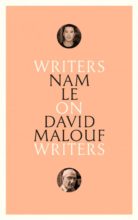 On David Malouf
On David Malouf Sarah Attfield is a poet from a working-class background. Her writing focuses on the lived experiences of working-class people (both in London, where she grew up and in Australia where she lives). She teaches creative writing in the School of Communication at UTS. She is the co-editor of the Journal of Working-Class Studies.
Sarah Attfield is a poet from a working-class background. Her writing focuses on the lived experiences of working-class people (both in London, where she grew up and in Australia where she lives). She teaches creative writing in the School of Communication at UTS. She is the co-editor of the Journal of Working-Class Studies. Beth Spencer’s books include Vagabondage (UWAP), How to Conceive of a Girl (Random House) and most recently, Never Too Late (PressPress). She writes fiction, poetry, essays and writing for radio and performance. She has won a number of awards, including the Carmel Bird Digital Literary Award in 2018 for her short fiction collection The Age of Fibs, now a Spineless Wonders ebook. She lives on the Central Coast NSW.
Beth Spencer’s books include Vagabondage (UWAP), How to Conceive of a Girl (Random House) and most recently, Never Too Late (PressPress). She writes fiction, poetry, essays and writing for radio and performance. She has won a number of awards, including the Carmel Bird Digital Literary Award in 2018 for her short fiction collection The Age of Fibs, now a Spineless Wonders ebook. She lives on the Central Coast NSW.  Erin Shiel has poems published in Meanjin, Cordite and Australian Love Poems. In 2018 she was shortlisted for the University of Canberra VC Poetry Prize. She is writing her first collection.
Erin Shiel has poems published in Meanjin, Cordite and Australian Love Poems. In 2018 she was shortlisted for the University of Canberra VC Poetry Prize. She is writing her first collection.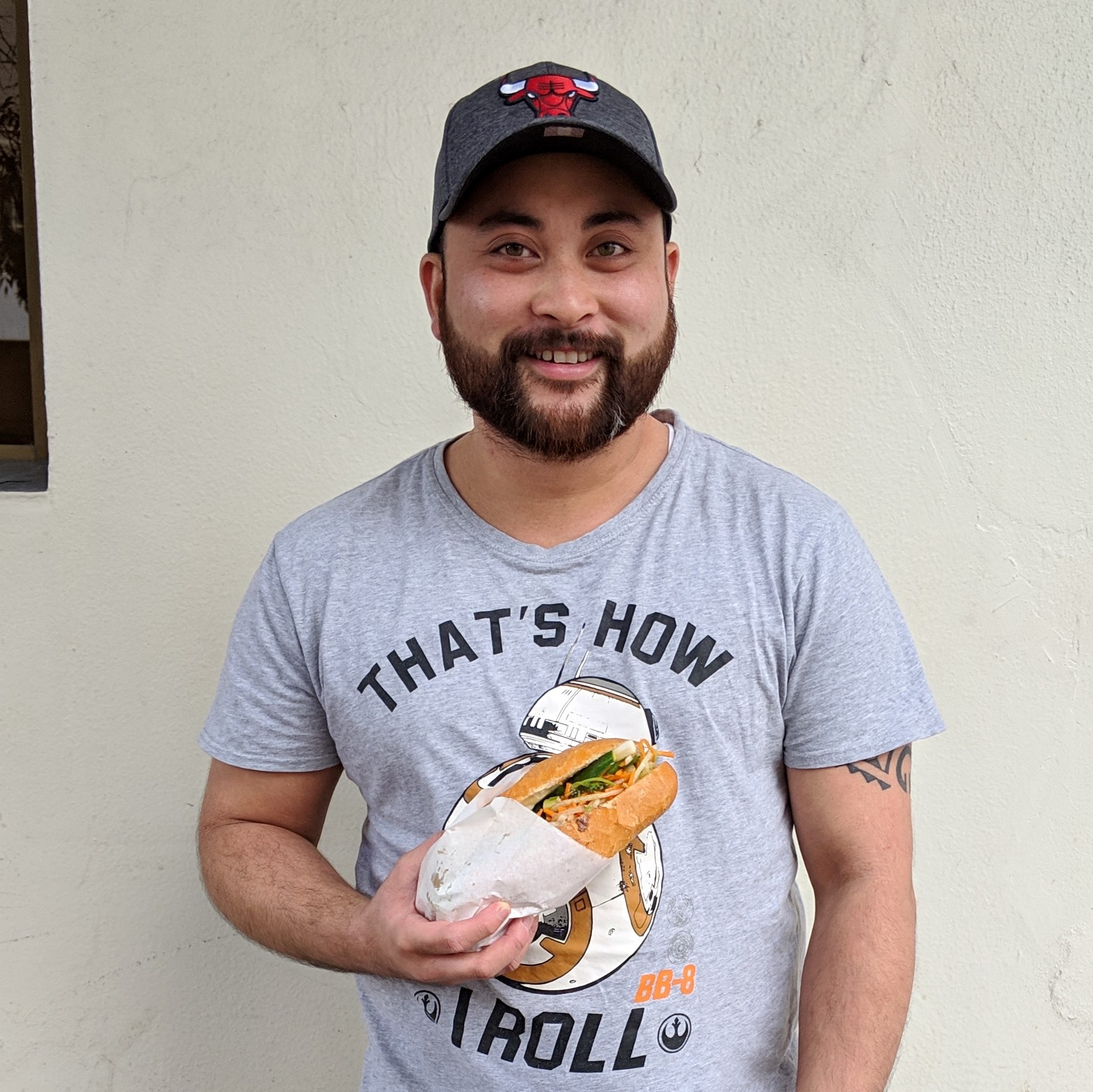 Joseph (known to some as Butch) is a Western Sydney based poet and visual media artist, born to Filipino immigrants. He enjoys doing laundry, long walks through Kmart, and late nights at Mr. Crackles in Darlinghurst. His practice explores the varied experiences of the Filipino diaspora in Australia. His works have been published in UNSWeetened Literary Journal, UTS Writers’ Anthology, and the Australian Poetry Anthology. Joseph’s favourite word is pie.
Joseph (known to some as Butch) is a Western Sydney based poet and visual media artist, born to Filipino immigrants. He enjoys doing laundry, long walks through Kmart, and late nights at Mr. Crackles in Darlinghurst. His practice explores the varied experiences of the Filipino diaspora in Australia. His works have been published in UNSWeetened Literary Journal, UTS Writers’ Anthology, and the Australian Poetry Anthology. Joseph’s favourite word is pie.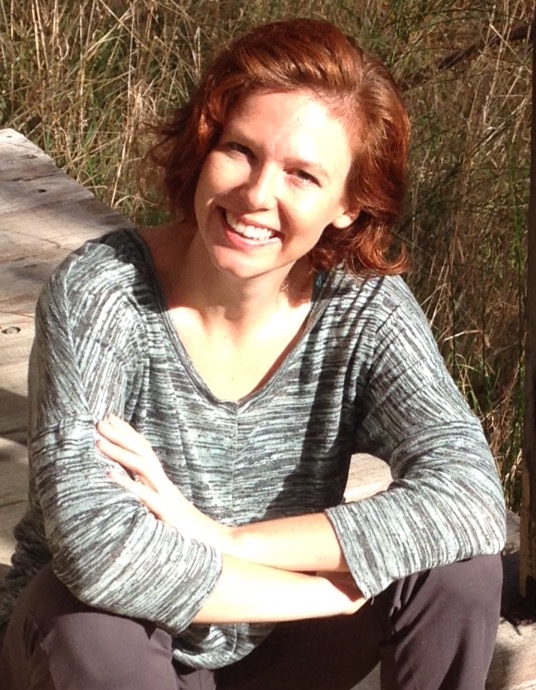 Bronwyn Lovell’s poetry has featured in Best Australian Poems, Meanjin, Southerly, Cordite, Antipodes, Rabbit, Verity La, and Strange Horizons. She has won the Arts Queensland Val Vallis Award and the Adrien Abbott Poetry Poetry Prize. She has been shortlisted for the Judith Wright, Fair Australia, Newcastle, Montreal, and Bridport Prizes.
Bronwyn Lovell’s poetry has featured in Best Australian Poems, Meanjin, Southerly, Cordite, Antipodes, Rabbit, Verity La, and Strange Horizons. She has won the Arts Queensland Val Vallis Award and the Adrien Abbott Poetry Poetry Prize. She has been shortlisted for the Judith Wright, Fair Australia, Newcastle, Montreal, and Bridport Prizes.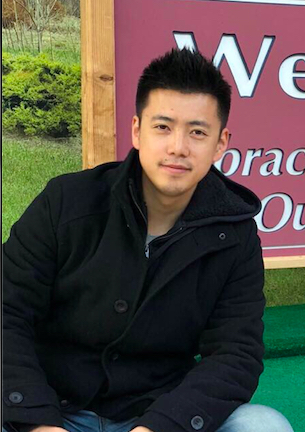 Aiden Heung is a native Chinese poet, born and raised on the edge of the Tibetan Plateau; he holds an MA in literature from Tongji University in Shanghai where he currently works and lives. His poems in English are published or forthcoming in many online and offline magazines, most notably Literary Shanghai, The Shanghai Literary Review, Cha: An Asian Literary Journal, New English Review, A Shanghai Poetry Zine, Aesthetic Apostle among many others. He is an avid reader. He can be found at
Aiden Heung is a native Chinese poet, born and raised on the edge of the Tibetan Plateau; he holds an MA in literature from Tongji University in Shanghai where he currently works and lives. His poems in English are published or forthcoming in many online and offline magazines, most notably Literary Shanghai, The Shanghai Literary Review, Cha: An Asian Literary Journal, New English Review, A Shanghai Poetry Zine, Aesthetic Apostle among many others. He is an avid reader. He can be found at